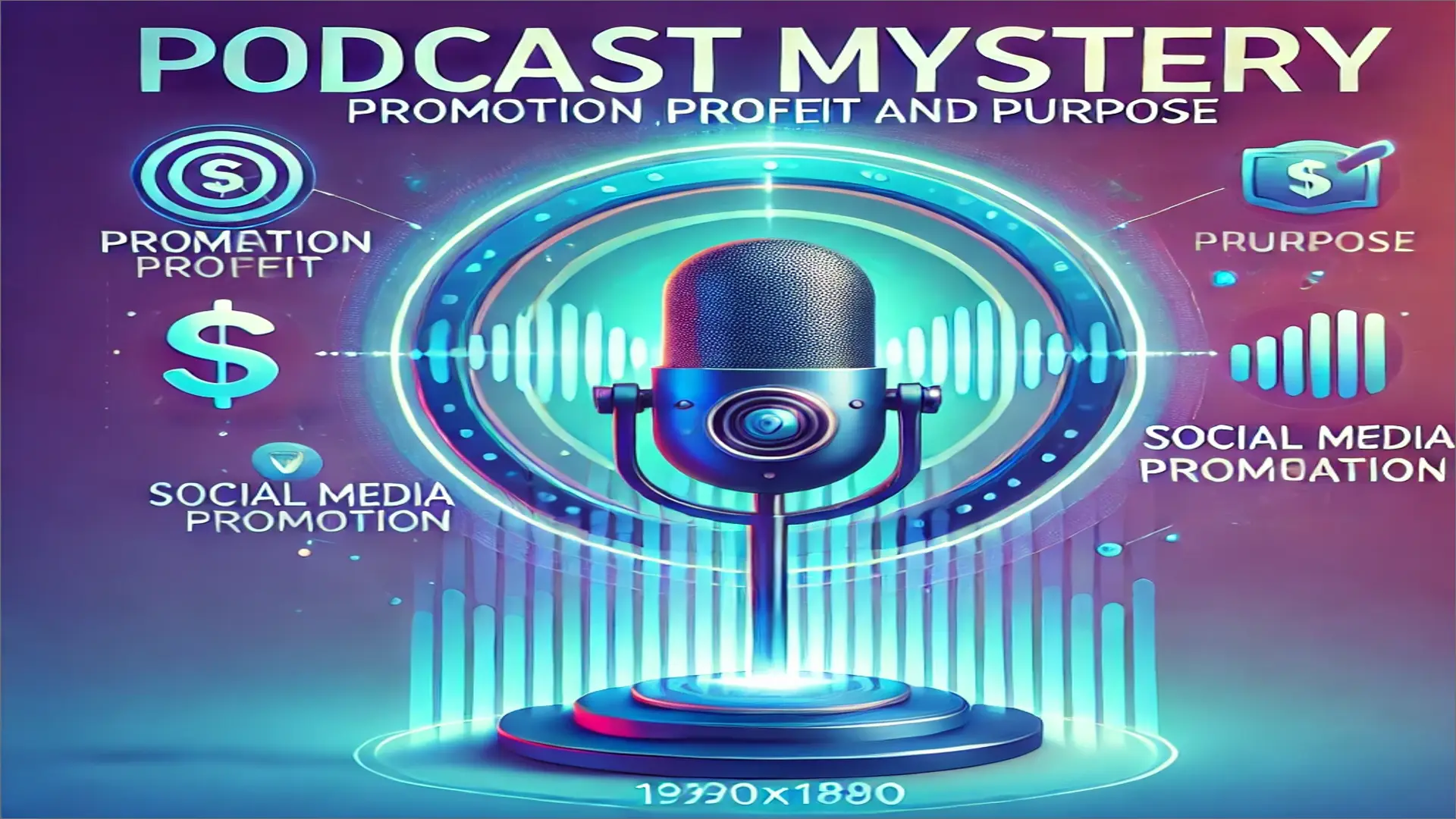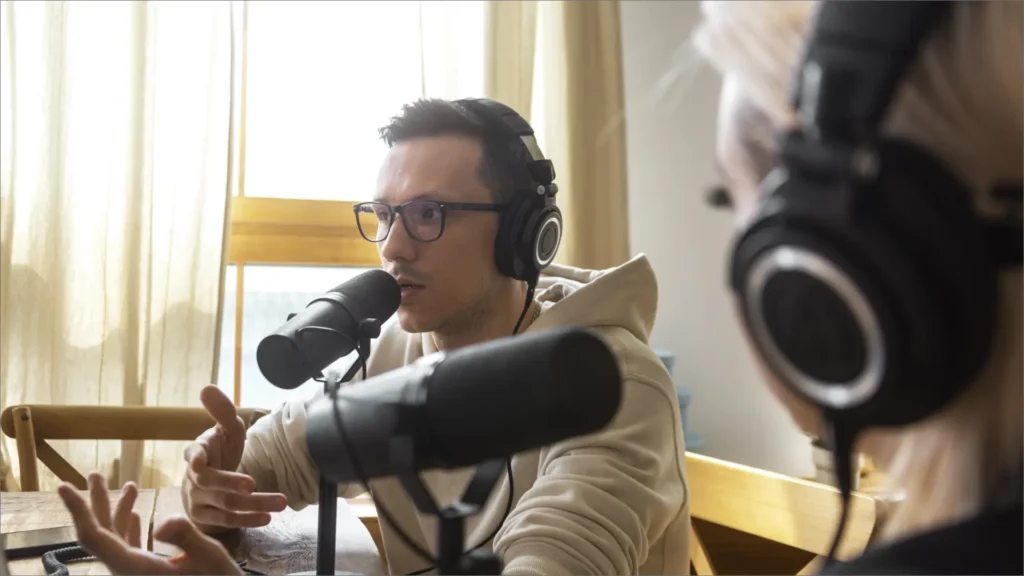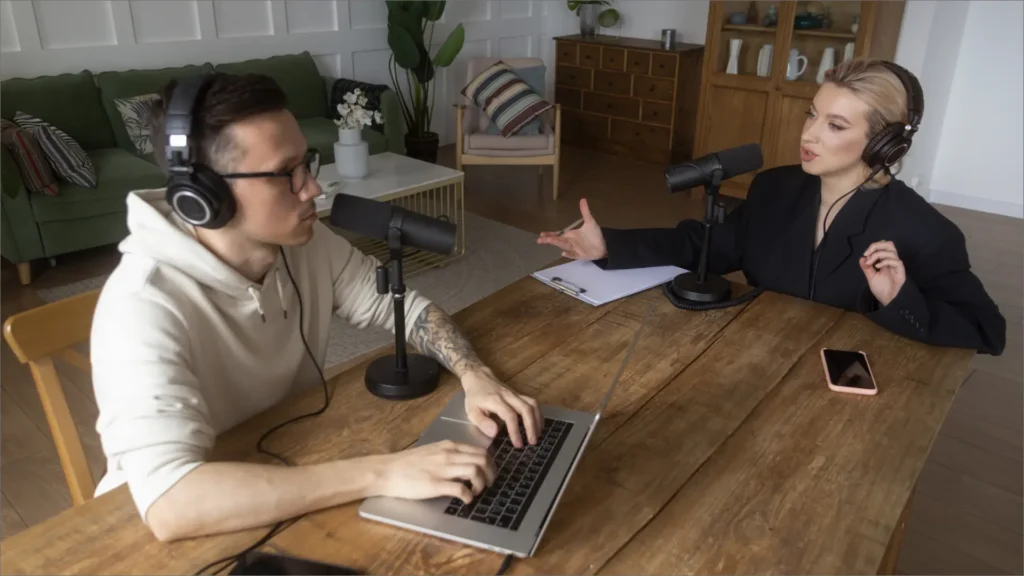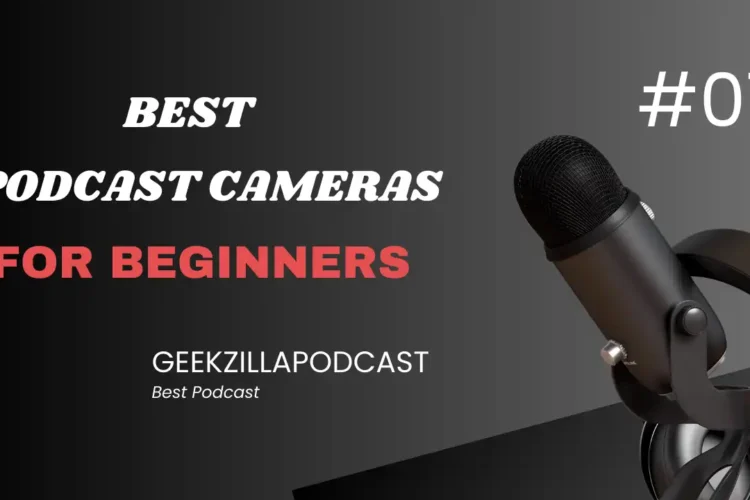
Perhaps you’ve been hiding under a rock somewhere. Maybe you need to find information on your favourite subject to read more about it. Regardless, this article is for you if you have asked questions about what a podcast is and how it operates.
Podcasting has been a recent media method since it gained recognition at the beginning of the 21st century. Hopefully, I have clarified this by pointing out that the word was coined in 2004. They are a relatively new media form; however, they have greatly influenced people worldwide.
Let’s start by asking what a podcast is and why it attracts many listeners and producers. Podcasts are like radio shows but have distinct characteristics that make them enjoyable to both the audience and the producers.
What Is A Podcast?
It is a Digital audio program in a series of mp3 episodes that should be downloaded or listened to online. It works very much like a radio show but with one significant difference:
These shows and radio programs are alike in that you can access and listen to them whenever you wish to. On average, they are comprised of verbal content from a host or multiple hosts and, to some extent, may also contain music and sound effects. Competing episodes (and the show) are themed around parenting, business, food, etc.
Of course, there is far more to it now. Therefore, here is all the information about them and how to enjoy (and even produce) them. If you look forward to being your host will guide you through starting your podcast.
How Podcasts Work?
The world of podcasts can be described in its simplest form: First, a person records a show and then trims it. After that, they distribute it through this service or upload it to their site with the help of a Flash MP3 player. Consumers then download it through a show producer who makes it available online via the computer, tablet, or phone.
To understand how it works, you must first understand two key things: internet video casting and its standard structure.
Audio and Video
Podcasting used to be strictly an audio format, but it is not like that now. According to its aggregator Listen Notes, as of October 2021, there were more than 2. Currently, there are claimed to be 6 million shows online. It has been estimated that around 17% of them contain visual elements.
These visual elements could be:
- A feed of a live video of the show host as they present the show
- Presentations with different images, schematics, photos, and graphs to convey specific information
- Recorded skits, sample videos, and interviews.
- Therefore, I want to stress that lovely illustrations do not have to be present for a podcast to be good, but they do make it good. That’s because visual elements can: That’s because visual elements can:
- Explain complex concepts and specific moments that are challenging to describe through the microphone.
- Make it possible for podcasters to reach more people and join a variety of users who post video content on Twitch or YouTube.
- Make it as personal as possible between the host and the listening person.
- Display a competitive edge that may positively impact the ROI of the video show.
General Structure (Conventions)
As we discussed in detail in the section called ‘Types Of Podcasts’, there is a vast variety of them, and they all are distinctive. However, most of them follow a structure like this:
- Brief description of the events that occurred in the previous episode (if it is a serial show)
- Title sequence and tag with 1–5 minutes length (It is one of the most critical stages of a show because it is aimed at capturing the consumer’s attention).
- A 5–25 minute part of a program or program segment.
- 1–4 minute-long ad read
- The analysis will involve excluding another 5–25 minutes of content sections.
- The second one is a 1–4 minute ad read
- Conclusion
- Promo for the next episode in case the present one is in a series
Purpose Of Podcasts

Not all fantastic shows are intended to achieve the same purpose; in most cases, a podcast can be considered a form of entertainment. It might be to gain more information in an area of interest, get informed on social matters, or for a joke.
Podcasts can also be viewed as great advertising prospects. They help advertise your business, reach more people, or target your clients. Similarly, if a host can cultivate an audience for a show, it can also help establish trust.
Currently, there are over 100 million active listeners in the United States, and this kind of content is becoming increasingly popular each year. Some podcasting goals may be informational, motivational, or persuasive about the audio program audience. In conclusion, it is a platform for distribution. While some feel comfortable reading articles, others look forward to something they can hear. It is versatile, and podcasters can use the technology to engage their audience in many ways.
What About The Term Itself?
Yes, that is an exciting story as well.
I can remember that the word is a combination of the words iPod and Broadcasting.
The term was initially coined in 2004 by British journalist Ben Hammersley to describe the distribution of audio content over the Internet based on the most popular player at a time.
Of course, podcasting today is not exclusive to iPods alone. Listening to audio podcasts across virtually every piece of audio playback equipment is possible. It is funny that the word remained, which we now employ to refer to these incredible audio shows.
What Are The Different Types of Podcasts?

In other words, when you ask somebody, ‘What is a podcast?’ they will tend to give you different types of shows. You will be pleasantly surprised if you consider an audio format somewhat restrictive.
There are many approaches to presenting a show so that it would remain engaging and exciting for the listeners. One must decide on a streamlined format and be consistent to create a strong foundation of listeners, Clinton. If your show involves a serious monologue one week, a comedy panel the next, and storytelling the next, you will alienate your listeners.
i. The Interview Podcast
There is no week without at least one episode in this format, as it is the most coveted format for shows. A series is a host (or hosts) interacting with a new guest in each episode. This is another kind of show that mainly involves interviews.
ii. Solo/Monologue Podcast
A narration with one individual as a speaker is appropriate for anyone with vast knowledge and understanding in a particular area of specialization. This is a standard format often used in educational shows.
iii. Conversational/Co-Hosted
This refers to the act of two people (who are compatible) engaging in some form of communication.
iv. Panel Podcast
It is like an interview-style show with more people in a conversation and is candid.
v. Nonfiction Storytelling
These are episodes depicting events that took place in real life; it could be a sequence of murders, an account of an adventure to Mount Everest, or even a documented historical event.
vi. Fictional Storytelling
These fiction shows are considered to be broadcast in multiple parts, like dramatic television programs. Some can be told by an individual, while others have several voice actors.
vii. Repurposed Content
This is the process where information is converted from its text-based format to an audio form. For instance, a church might record the sermons conducted within the church and upload them to create an episode.
Want To Start A Show But Are Not Sure How To?
They are media that have moderate difficulty getting started compared to other forms of content creation.
However, once all the pieces are set, generating a new episode will not require as much time as developing a blog or filming a video. This is true mainly when you outsource monotonous aspects like editing and promoting the content.
Well, the question is, how do you start it? The answer is simple: follow these ten steps.
- Choose a topic
- Determine the suitable format.
- Correctly name your show.
- Create cover artwork
- It is now high time that you purchase some necessary and fundamental tools.
- Select a hosting service.
- Plan your first episode.
- Record your first episode.
- Edit your episode
- Upload your episode
Do You Want To Promote Your Show?
After your show has reached the point where it can be indexed and downloaded, you must share the information about the new serial. You can start from the ground up, like sending direct links to several friends and loved ones, paying for several social media ads, or anything in between.
Another common way of advertising your show is through social media platforms like Instagram, Twitter, Facebook, and, most recently, TikTok. You can also market the show using accounts you may have created and followers you have accumulated on social media. If not, many brand-new accounts are entirely acceptable when solely used to share the word about it and interact with the community.
Is it possible To Make Money Podcasting?
Absolutely. But let’s get real. We do not propose that your show become a money-maker within the first week. The same applies here; you can’t expect the benefits when you don’t exert the effort required.
Promoting your show is a common strategy for show monetization. It will only help you in the long run if you’ve been building your podcasting or personal brand. If you have a captive audience, you can make thousands of dollars through it.
In essence, the following are the ways through which podcasts make their money:
The most fascinating monetisation aspect is the vast possibility of earning money from one’s webinar.
Bear in mind that different money-making methods are more viable or effective at different stages of growth: things that may be effective for a higher-ranking, better-recognized show may not be as helpful for a show that only recently began, and that is alright!
1. Sponsored Ads (or Episodes)
Sponsorship is standard in most broadcasts; if you have ever listened to it, you most likely heard a podcaster read out a sponsor’s ad. Other firms will compensate you based on your ability to read a short script in your show advocating for a specific product.
Many people believe that ads can be relatively easy to monetize. However, the catch is that one needs more listeners with specific demographic information. Sponsors of your show will wish to make doubly sure that your serial is a perfect fit for their advert by checking the number of listens or downloads you have and other details about your listeners.
2. Affiliate Codes or Links
Having stemmed from the sponsored ads, brands you place your advertisements for may also offer you a unique code for the listeners to use. You could then receive a small percentage of the sales each time a customer uses your discount code at the point of payment. You can also spread affiliate codes in your show notes and on social media so that they can be used more often.
3. Advertising Your Services or Products
Talking about your show related to existing services or products increases sales. Please describe what you offer and how your service benefits your audience. This method can educate listeners and compel them to make a purchase.
4. Consulting or Coaching
In another case that has to do with subject matter expertise, you might find that your industry knowledge is highly wanted even for the free information you give on your podcast. As your audience, people can hire you as a consultant or a coach, such as those who wish to get your advice.
5. Accepting Donations or Tips
Episodes require resources in terms of time and effort to conduct the show. The last way of generating revenue for each episode is to ask the audience to tip you or send you money. Some ways to gather funds include a Venmo or Patreon account or a GoFundMe page.
6. Gated Content or Memberships
These shows often do not charge for their content; however, one way of generating revenue is to make extra episodes premium. Thus, a listener must either pay a certain price or become a member and pay a monthly fee to access further information.
7. Advertising Networks
An advertising network works particularly well as an intermediary for your show. Advertising networks have deep relationships with brands and can provide access to opportunities that the candidate would never know existed. It is important to note that some networks allow members to contact the advertisers once they are inside the network, while others are more professional and advertise to the advertisers.
8. Selling Merchandise
Based on your brand and targeted listenership, you could consider selling custom merchandise with your logo, icon, catchphrases, or slogans. For instance, if you have a show about organizing your life, embossing a planner with your logo or a catchy line could be a significant source of your earnings.
It is generally enjoyable in the beginning. However, like all things in life, nothing is simple and requires a little effort and preparation at the beginning. If you approach the show’s creation with the right attitude and realistic expectations, your episode can be as rewarding and lucrative as you want.
Are You Finally Ready to Start It?
I hope the information provided in this guide was valuable to you! Perhaps you are motivated to find a new show to start listening to or even become a podcaster!
But you must look at the advantages and disadvantages before going into it.
Benefits And Drawbacks
Many advantages can result. A podcast can help you:
- Grow your brand or business
- Meet new people
- Develop new income streams
- Expand your audience
All the same, podcasting may not have the potential to appeal to everybody. They require specific time, effort, dedication, and capital to produce and distribute over the initial and subsequent episodes. To succeed, you have to develop a quality show that is aired at appropriate times.
FAQ’s – Podcast Mystery
Q1 : What is the difference between a podcast and an episode?
A podcast denotes the entire episode, while an episode of that show is referred to as an episode or simply an episode.
Q2 : What is the difference between a podcast and an audio file?
This is an audio file, which is actually a segment of sound. Podcasters perform their episodes and keep the episode as an audio file on a computer or using cloud storage. The show is delivered to users through the World Wide Web in the form of MP3 (or video) files.
Q3 : What is a podcast, and how does it operate?
Podcasting is an audio and occasionally video format of creative media. Podcasters upload episodes, which they download and listen to on a portable device or a computer.
Q4 : Are they for free?
Yes, mostly. Many apps for listening to podcasts are also available for free, and while certain closed or premium shows may be paid, most shows are free to listen to.
Q5 : Which is the best podcast application?
If you are searching for more shows, Apple Podcasts or Google can be used to find the most significant number of shows. Consider Spotify if you want a platform incorporating these shows with other products, including music. Audible is perfect if you prefer to use shows and audiobooks simultaneously. If you want to make slight changes, go for the Overcast app.
Q6 : Podcast Monetization: How do people earn money?
Podcasters can be paid in the following ways. The most prevalent is obtaining sponsorships, where brands compensate them for reciting commercials on their program. Other strategies are affiliate marketing, premium content, and requesting the listeners to fund them directly instead.
Read More : How To Start A True Crime Podcast in 2024?
Read More : How to Record a Podcast on Zoom in 2024?


